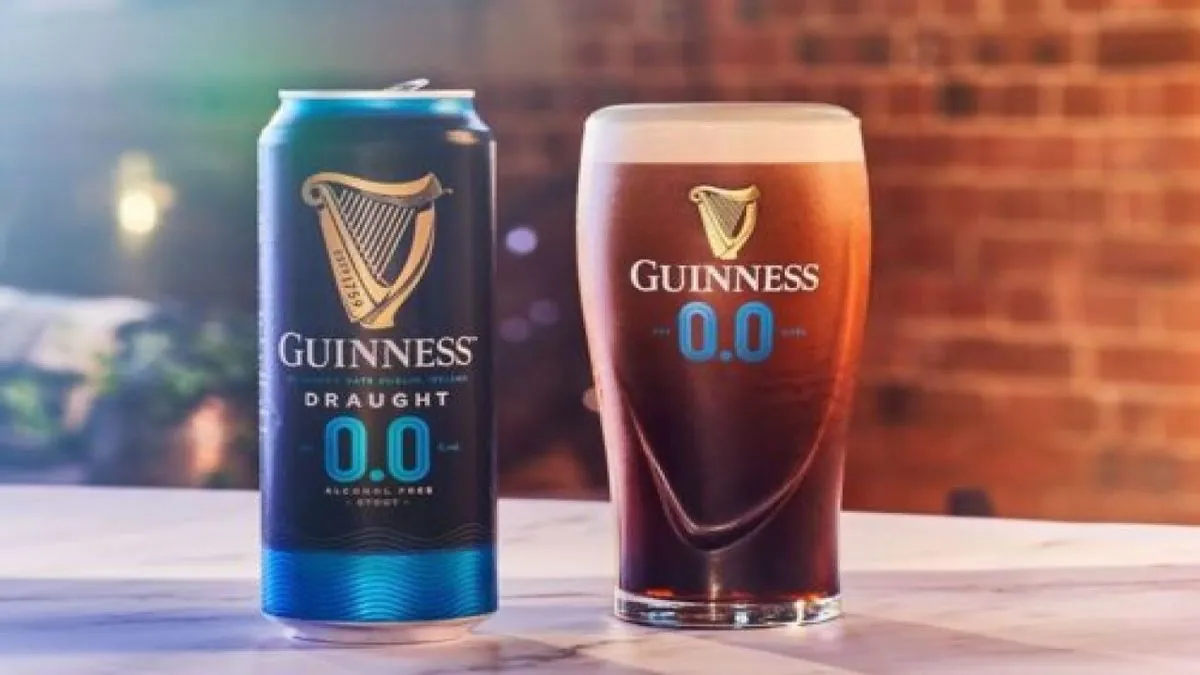Non-Alcoholic Guinness Could Outpace Original, Predicts Diageo Executive
Diageo's marketing director foresees non-alcoholic Guinness potentially surpassing its traditional counterpart in popularity, driven by health-conscious younger consumers and soaring demand for alcohol-free alternatives.

In a surprising turn of events, Anna MacDonald, marketing director at Diageo, has suggested that non-alcoholic Guinness could potentially eclipse its iconic alcoholic counterpart in popularity. This prediction comes amidst a significant surge in demand for alcohol-free beer, particularly among health-conscious younger consumers.
Guinness, the renowned Irish stout first brewed in 1759 by Arthur Guinness, has been adapting to changing consumer preferences. In 2021, the company introduced an alcohol-free version in Britain, capitalizing on the growing trend of non-alcoholic beverages. This move has proven successful, with Guinness 0.0 sales doubling in Europe over the 12 months leading up to June 2023.
The success of Guinness 0.0 has been remarkable, with MacDonald stating, "Already the trend [for non-alcoholic beer] is accelerating more than we thought." The alcohol-free variant has become the UK's best-selling non-alcoholic beer and now accounts for approximately 3% of total Guinness sales worldwide.

Diageo, the parent company of Guinness, is not resting on its laurels. The company is planning to expand the availability of Guinness 0.0 on draught across UK pubs, a move that could further boost its popularity. Currently, the non-alcoholic version is only available on tap in Ireland, while most UK pubs sell it in cans.
The shift towards non-alcoholic options reflects a broader trend in consumer behavior. MacDonald noted, "Health and wellbeing is a big trend, particularly among the younger generation." This aligns with Guinness's long history of innovative marketing, dating back to the famous "Guinness is Good for You" campaign.
Interestingly, the popularity of traditional Guinness has also been on the rise, shedding its image as a drink primarily for older male consumers. Debra Crew, Diageo's CEO, observed in January 2024, "We are seeing more and more Guinness drinkers that are women." This diversification of the consumer base has been aided by social media influence and celebrity endorsements, with figures like pop star Olivia Rodrigo and politician Sir Keir Starmer being photographed with pints of Guinness.
"The gods of fashion have smiled upon Guinness, previously consumed by blokes my age, but now widely adopted by younger generations."
The brand's popularity has extended beyond its traditional association with rugby. In a significant move, Guinness has become the "official beer" of the Premier League, winning a multimillion-pound bidding war against Heineken and replacing Budweiser.
As Guinness continues to evolve and adapt to changing consumer preferences, it's clear that both its alcoholic and non-alcoholic offerings are finding new audiences. Whether the alcohol-free version will indeed surpass its traditional counterpart remains to be seen, but one thing is certain: the iconic black stout, with its creamy head and smooth texture, continues to captivate drinkers around the world, 265 years after Arthur Guinness first began brewing in Dublin.


































